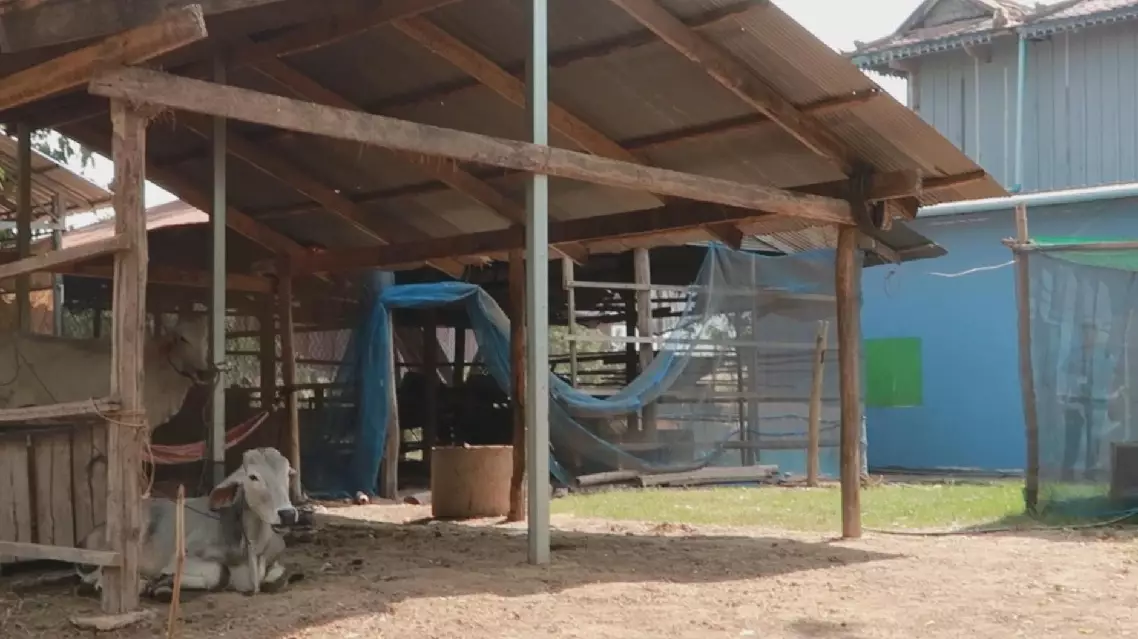The living standards of villagers in southeastern Cambodia have seen significant improvements thanks to a Chinese agricultural pilot program launched nearly a decade ago.
Around 1,000 families in the villages of Svay Ampear and Chheu Teal Phluoh, Kandal Province continue to benefit from the success of the China-Cambodia Poverty Reduction Project, implemented between 2017 and 2020.
Under the project, China built new homes, renovated existing ones, and provided clean water supplies, toilets, cattle sheds, and cows for the villagers.
Villagers also received training on how to grow vegetables, chilies, and tropical oyster mushrooms.
"Upon receiving this project, several families had creative ideas. Chinese experts taught them to grow in pots. But now they have started to expand it to grow in the ground, and they have started to plant other vegetables, such as winter melon, cucumber, and bitter melon, on a large scale. So their livelihood has improved," said Neang Chanra, a member of the Svay Ampear Commune Council.
Srung Ngim, a local mushroom farmer, said that China's project has changed her life, enabling her to support herself and her family.
"My life before was very difficult. At the time, I didn't have a home yet and I lived in a hut. After they introduced me to this project, my life changed and improved a lot. Before, I incurred debt for building a house, but now I'm able to pay them back after farming mushrooms. It's a lot better. These mushrooms will become my main business, but if there's anything else I can explore in business, I will also expand," she said.
Ngim has also taught other villagers how to grow oyster mushrooms, empowering them to establish their own farms.
"I plant mushrooms in three factories. These two factories have around 20,000 packages of mushrooms, and this one has around 7,000 packages of mushrooms. Also, I get to teach my neighbor and two sisters how to grow these mushrooms. Each of them plants about 7,000 packages of mushrooms in a factory now," she said.
Iea Sivorn, a waste picker and single mother with two children, lives in a home built through the project.
"My mother saw me struggling to live in a hut, and she asked China to build this house for me. Without this support, I don't have the capacity to build my own house because I cannot earn anything. When I lived in a hut, it was very difficult. It sank when it rained," she said.

Chinese agricultural program improves village livelihoods in southeastern Cambodia
Visiting Chinese Foreign Minister Wang Yi said Saturday China is willing to work with Lesotho to strengthen exchanges on governance experience, enhance coordination in multilateral affairs, and advance the China-Lesotho strategic partnership.
Wang, also a member of the Political Bureau of the Communist Party of China Central Committee, made the remarks when meeting with Lesotho Prime Minister Sam Matekane in the capital of Lesotho.
During the meeting, Wang congratulated Lesotho on the 60th anniversary of its independence this year, and spoke highly of Lesotho government's efforts to prioritize economic development and steer the African country onto a path of sustainable growth. Since the Beijing Summit of the Forum on China-Africa Cooperation (FOCAC) in 2024, the two sides have advanced cooperation under the 10 partnership action plans unveiled at the summit, successfully implementing a number of key projects to effectively promote Lesotho's development and revitalization, Wang said.
China stands ready to work with Lesotho to strengthen exchanges on governance experience, enhance coordination in multilateral affairs, and push for greater development of the China-Lesotho strategic partnership, he added.
Calling on the two sides to firmly support each other, Wang said that China will accelerate the implementation of its zero-tariff policy for African countries, including Lesotho, expand bilateral trade, investment and industrial cooperation, facilitate broader access of Lesotho's specialty products to the Chinese market, and continue to support Lesotho's national development.
China will continue to stand firmly with African countries, uphold justice for the Global South, including Lesotho, oppose unilateralism and acts of bullying, and work together to build a community with a shared future for humanity, Wang said.
On his part, Matekane said during the meeting that Lesotho cherishes its friendship with China and the strategic partnership between the two countries, and expressed gratitude for China's valuable support for the development of African countries, including Lesotho.
Lesotho firmly adheres to the one-China principle and resolutely supports China in safeguarding its core interests, he said, noting that his country stands ready to strengthen strategic mutual trust with China, expand people-to-people exchanges, jointly implement the outcomes of the FOCAC Beijing Summit, and deepen cooperation in areas such as infrastructure, manufacturing and energy.
Matekane stressed that China's zero-tariff policy for African products will inject new impetus into Lesotho's development. He also expressed Lesotho's willingness to strengthen solidarity and cooperation with China on multilateral platforms such as BRICS to jointly address global challenges.
On the same day, Wang also held talks with Lejone Mpotjoana, minister of foreign affairs and international relations of Lesotho.

China, Lesotho to strengthen exchanges, advance cooperation

China, Lesotho to strengthen exchanges, advance cooperation











